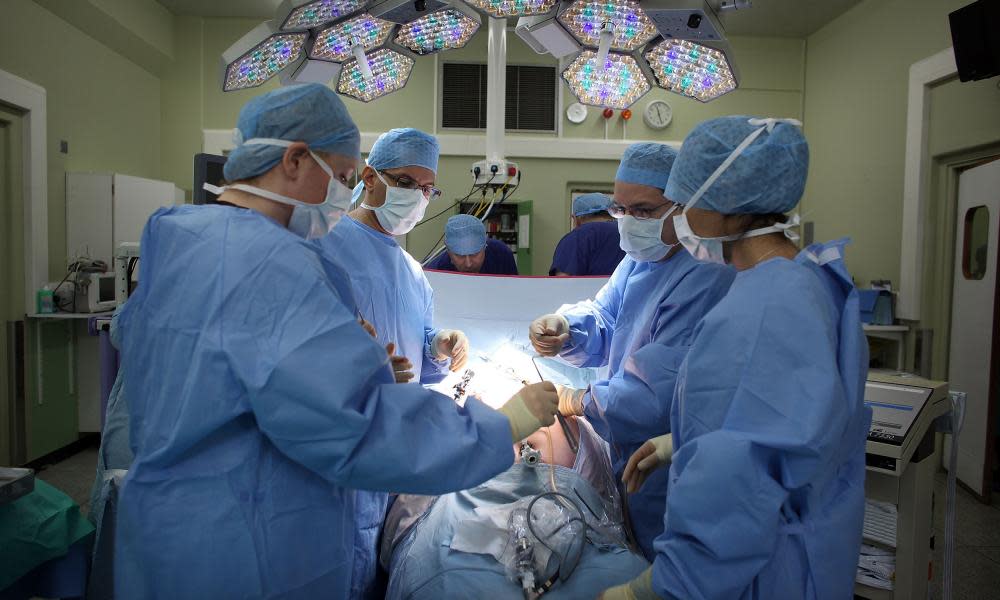Urgent surgery ‘may be postponed’ by nurses’ strikes, say NHS bosses

Hospitals may not be able to provide key elements of healthcare such as urgent surgery, chemotherapy and kidney dialysis during the forthcoming strikes by nurses, NHS bosses have said.
Trusts may also have to stop discharging patients, postpone urgent diagnostic tests and temporarily withdraw services to people undergoing a mental health crisis.
Executives have been warned that industrial action by nurses in their pay dispute with the government could mean that a range of important, and in some cases time-critical, services to seriously ill patients may have to be scaled back or suspended altogether.
Related: Nurses to strike for two days as December disruption deepens
NHS England bosses have raised that possibility in a letter sent on Monday to hospitals and other care providers ahead of crunch talks with the Royal College of Nursing later this week. At that meeting they will try to agree what areas of care will be hit on Thursday 15 and Tuesday 20 December, and which will continue as normal because they are covered by “derogations” – agreed exemptions to the action.
The letter sets out a list of 12 areas of care and some non-clinical activity in hospitals, such as food supply, which could be affected if agreement is not reached with the nurses’ union.
Eight of those involve direct patient care, three involve support services in NHS trusts and the other involves “system leadership and management to oversee safe care” on strike days.
Both sides are expected to be able to easily agree that nurses will still work as normal to allow the delivery of some clinically important types of care on that list, such as “time sensitive” treatment that involves “immediate lifesaving or limb or organ-saving intervention”.
However, the RCN is unlikely to agree that all eight areas of care proceed as normal. Union officials say there is no guarantee that any of those will definitely be provided.
The RCN is close to finalising its own list of which services count as “life-preserving” and therefore exempt, and which others its members will refuse to work in. It faces difficult decisions over whether, for example, sessions of chemotherapy for cancer patients or dialysis for those with serious kidney disease count as “life-preserving” or care that can be postponed.
Related: Nurses among rising numbers of workers using food banks, research shows
The RCN is embroiled in an increasingly heated war of words with Steve Barclay, the health secretary, over the union seeking a payrise that equates to inflation plus 5%, or 16.1%. He has dismissed the RCN’s pay claim as unaffordable and unreasonable.
On Monday Barclay insisted his “door is open” to resume talks with health unions to avert the strike action, as he warned “there will be impacts on patients if the strikes go ahead”.
But the RCN general secretary, Pat Cullen, has accused the government of being the main obstacle to a deal and choosing “strike over negotiation”. “And I find that appalling, really appalling, to sit here today and to find that they’re not willing to negotiate with us,” she said.
NHS England’s letter sets out 10 other types of vital care, mainly involving life or death scenarios, headed “derogations not needed”, which they hope to agree with the RCN to go ahead as normal.
These include A&E care, services in intensive care units and emergency operating theatres as well as maternity services, including the delivery of babies, psychiatric intensive care, time-critical organ transplants and palliative and end of life care.
However, regardless of whatever national agreement NHS England and the RCN reach, all the 160 trusts and other NHS organisations in England in which a majority of nurses have voted to strike will also have to agree with their local RCN strike committee where disruption will occur.
The letter was signed by Mike Prentice, NHS England’s national director for emergency, planning and incident response, and Navina Evans, its chief workforce officer.
Meanwhile, the chief executive of NHS England has insisted patients will not have procedures cancelled at the last minute due to the nurses’ strikes, but warned some care would have to be delayed.
Giving evidence on Monday to the Commons public accounts committee, Amanda Pritchard said she could not confirm how far in advance people would be updated about any changes to upcoming treatment but that efforts would be made to inform them “sooner rather than later”.
Committee chair Meg Hillier MP asked her: “When you’ve got that [notice of strike action], how quickly can you kick in any changes and, crucially, let patients know whether their treatment will be going ahead or not?”
Pritchard said the pay dispute presented “an extraordinarily difficult set of circumstances”.
She added: “The hopeful next step will be for us to agree that overall set of principles around derogations with the trade unions, we’re doing that jointly with the department [of health and social care], of course, but then it is going to be for local trusts to work through the details for themselves with clinical teams, with their local trade unions, and part of that will be about making that patient-by-patient decision so that we can let people know sooner rather than later.”

 Yahoo Movies
Yahoo Movies 
